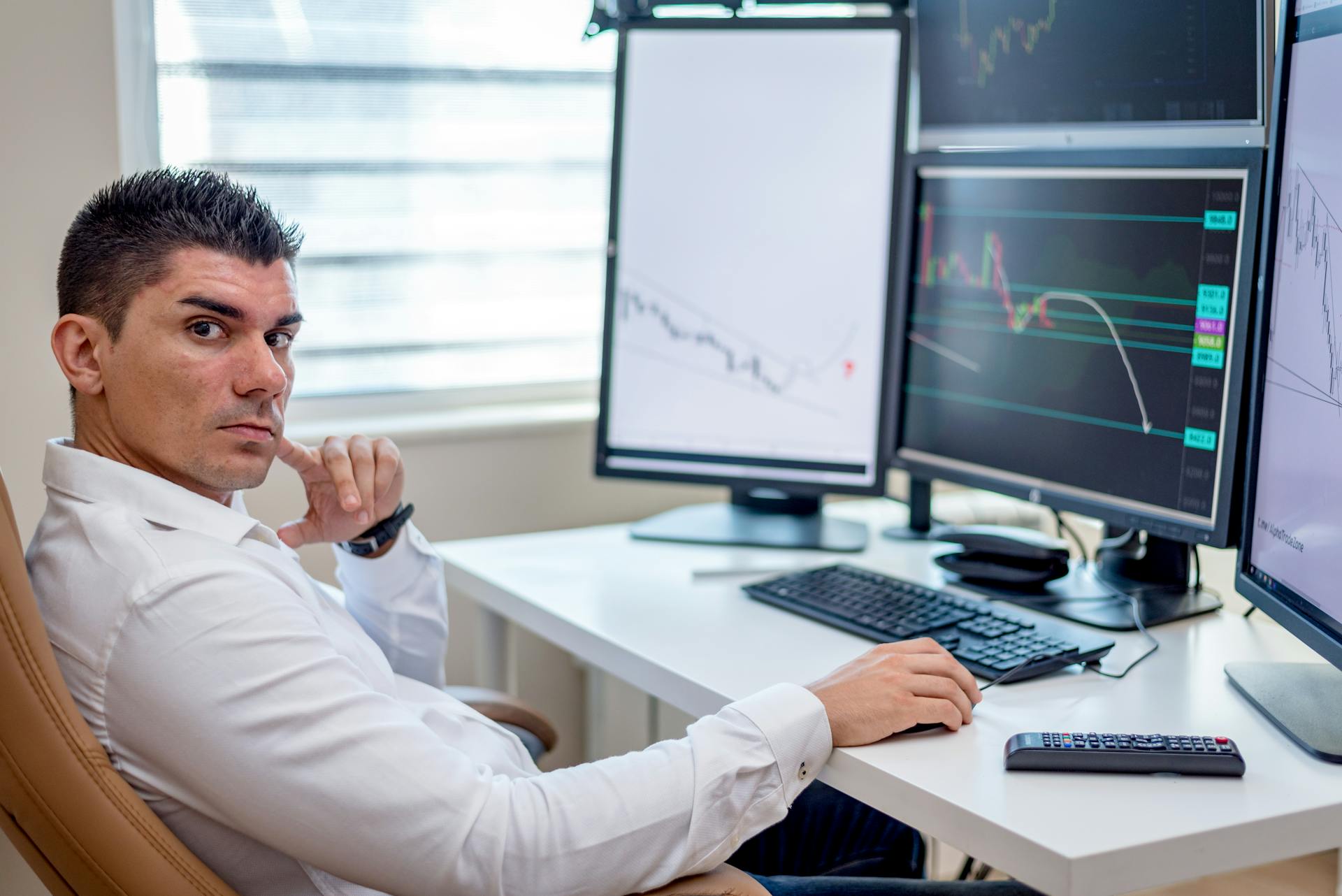
Political risk analysis and consulting can seem daunting, but it's a crucial field for businesses operating globally. Political risk analysts assess the likelihood and potential impact of political events on business operations.
These analysts often focus on areas like government stability, policy changes, and social unrest. They consider factors like economic growth, corruption, and human rights records when evaluating a country's risk profile.
To navigate this complex world, it's essential to have a solid understanding of the key drivers of political risk. This includes identifying potential flashpoints, such as elections, natural disasters, or changes in government leadership.
Consider reading: Political Call
What is a Political Risk Analyst?
A political risk analyst is a professional who assesses and predicts potential risks and challenges arising from political decisions, events, and developments. They examine political systems, policies, and global relations to offer valuable insights to businesses and organizations.
Their mission is to evaluate the intricacies of political systems, scrutinizing the distribution of power, decision-making processes, and the influence of various stakeholders. This keen understanding enables them to assess how political decisions and policies may impact businesses.
A fresh viewpoint: Political Risk Consulting Firms
Political risk analysts conduct comprehensive research on political trends and developments, drawing from various sources such as government reports, news articles, academic publications, and think tank analyses. Staying well-informed empowers them to identify emerging trends and potential risks.
Their key responsibilities include evaluating political systems, assessing geopolitical risks, conducting in-depth research, identifying business threats and opportunities, and providing recommendations and insights to businesses and organizations.
To give you a better idea of their role, here are some of their key responsibilities:
- Evaluating Political Systems: examining the distribution of power, decision-making processes, and the influence of various stakeholders.
- Assessing Geopolitical Risks: analyzing political dynamics between countries and regions, detecting potential risks like trade disputes, political instability, or conflicts.
- In-Depth Research: conducting comprehensive research on political trends and developments, drawing from various sources.
- Identifying Business Threats and Opportunities: assessing the potential impact of political developments and trends on businesses.
- Providing Recommendations and Insights: synthesizing intricate political information and trends into actionable recommendations for businesses and organizations.
Education and Training
Having a solid educational foundation is crucial for a career as a political risk analyst. A background in political science, international relations, economics, or a related field is highly beneficial.
Many employers prefer candidates with a bachelor's or master's degree in these disciplines. These degrees provide a solid understanding of political systems, international relations, and economic principles – all vital for political risk analysis.
Pursuing certifications like the Certificate in Political Risk Analysis (CIPRA) or the Certified International Risk Analyst (CIRA) designation can showcase your expertise and commitment to the field.
You might like: Dcf Sensitivity Analysis
Career Advancement
Career advancement in political risk analysis requires a combination of experience, additional qualifications, and continuous learning. Continuing education and professional development are essential for career growth.
To progress in this field, you'll need to develop leadership skills, effective communication, and stay updated on global political developments. This will help you navigate complex situations and make informed decisions.
With experience, you can move into senior positions and take on more responsibility, leveraging your expertise to drive business success.
A fresh viewpoint: Political Risk Insurance
Career Advancement Opportunities
As you navigate your career, it's essential to understand the opportunities for advancement in your field. The demand for qualified professionals is on the rise, particularly in the UK where businesses expanding internationally need skilled analysts to assess and mitigate risks.
Continuing education and professional development are crucial for career advancement in political risk analysis. This involves staying updated on global political developments and expanding your knowledge in the field.
Job opportunities can be found in various sectors, including finance, consulting, international organizations, government agencies, and think tanks. With experience and additional qualifications, you can progress to senior positions.
Leadership skills, effective communication, and staying updated on global political developments are essential for success in this field. By continuously honing these skills, you can seize the opportunities for growth and advancement in political risk analysis.
Explore further: Wef Global Risk Report
Agenda
To advance your career, it's essential to stay on top of the ever-changing policy and political environment. This means identifying potential threats that could impact your bottom line.
You'll want to assess the types of political risk and learn about forecasting models to help you map and strategize them. This will give you a solid foundation for understanding the potential impact of an issue on your company, stakeholders, customers, and others.
To establish a core set of principles for engagement, you'll need to consider your business operations, core values, and legislative positions. This will help you identify key factors of risk and conduct strategic issue assessments.
Here are the key takeaways from the agenda:
- Types of political risk: Identify and understand the potential threats to your business
- Forecasting models: Learn how to map and strategize political risk
- Strategic assessment: Determine the potential impact of an issue on your company and stakeholders
- Core set of principles: Establish a set of principles for engagement that aligns with your business operations and core values
- Key factors of risk: Identify the key factors that influence your risk profile
By following these steps, you'll be better equipped to navigate the complex world of politics and policy, and make informed decisions that will advance your career.
Challenges and Rewards
A career as a political risk analyst can be highly rewarding, but it comes with its own set of challenges. Dealing with uncertainty and the ever-changing nature of politics can be demanding.
You have the opportunity to work on high-stakes projects, which can be incredibly fulfilling. Influencing decision-making processes and contributing to the success of organizations operating in complex political environments is a significant reward.
Dealing with uncertainty and the ever-changing nature of politics can be demanding. Balancing objectivity while considering personal opinions and biases can be challenging.
You must remain impartial and independent in your assessments as a political risk analyst. This requires a high degree of self-awareness and the ability to separate personal feelings from professional judgment.
Suggestion: Regulation Z Truth in Lending Act
Frequently Asked Questions
Do risk analysts make good money?
Risk analysts can earn a median salary of $102,120 per year, making it a well-compensated career. However, starting salaries may be lower, ranging from $59,510 to $28.61 per hour.
What is the highest paid risk analyst?
Highest paid risk analysts can earn up to $200,000 per year, typically managing financials for companies investing in overseas markets. This lucrative role requires expertise in risk assessment and financial analysis.
Sources
- https://www.kroll.com/en/services/forensic-investigations-and-intelligence/intelligence-transactions-and-due-diligence/political-risk-analysis
- https://chambers.com/legal-rankings/political-risk-global-wide-96:3006:15649:1
- https://www.huzzle.app/blog/becoming-a-political-risk-analyst-a-comprehensive-guide
- https://pac.org/event/workshop-mapping-communicating-political-risk
- https://www.ey.com/en_dk/services/geostrategy/geostrategic-business-group
Featured Images: pexels.com

